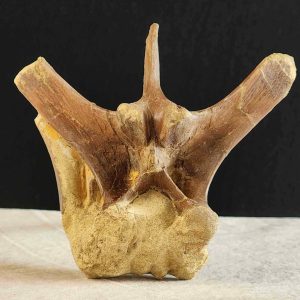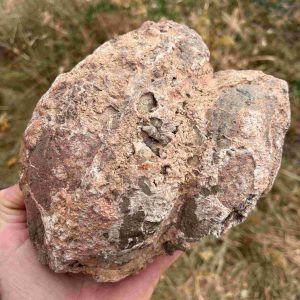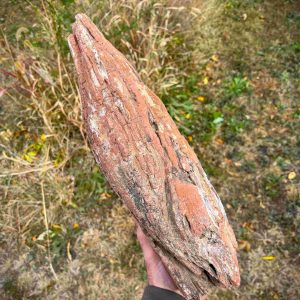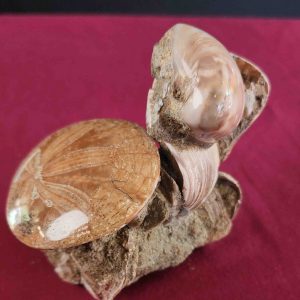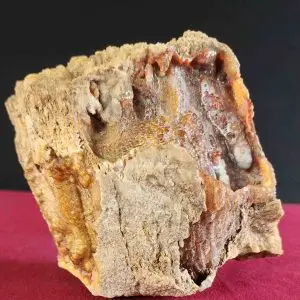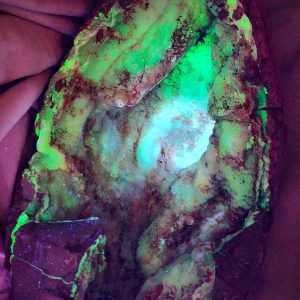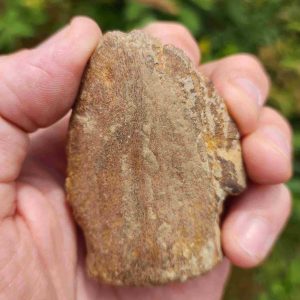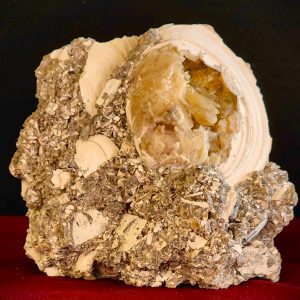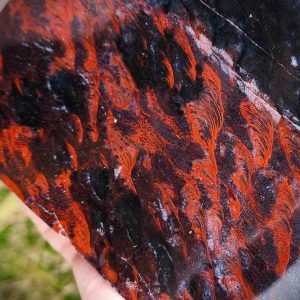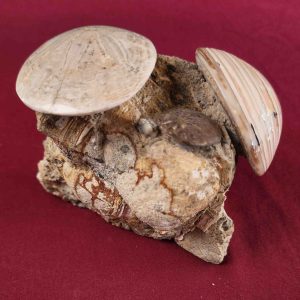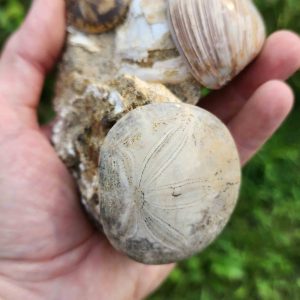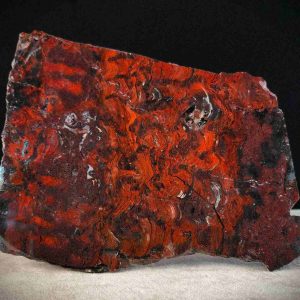- The product "St Clair Flora - Rare preservation (F4)" has been removed from your wishlist because it can no longer be purchased.
- Failed to add “St Clair Flora - Rare preservation (F4)” to your wishlist
-
Dinosaur Bones (D1)
Notes specific to this specimen: This is a very well preserved neural arch and process of a cervical vertebrae, probably about midway down the neck of a hadrosaur (bipedal) dinosaur. The centrum is not present. The fine detail on the bone surface is exquisite and remarkably well preserved. This exceptional piece has no reconstruction.
SIZE: 5″ x 5″ x 3″
NAME: Edmontosaurus
AGE: Cretaceous Period – 68 million years
UNIT: Lance Creek Formation
SITE: Lance Creek, Wyoming
Location: Blue Crate
DATE: 1992Documentation: This authentic fossil specimen comes with a Certificate of Authenticity and Origin.
$820.00Dinosaur Bones (D1)
$820.00 -
Volcanic Bomb (EB14)
Notes specific to this specimen: Rare double bomb. These unique specimens form when two magma projectiles run into each other in flight before they completely harden. In this case the merge was early in the ejection event, before the two projectiles had started to acquire their own individual character. Instead the combination of the two was almost obliterated by the overall form taking shape before they fell back to Earth.
SIZE: 9″ x 6″ x 4″
NAME: Various forms
AGE: Pliocene Epoch- 5 million years
UNIT: Banbury Formation
SITE: Elko County, Nevada
Location: Green Crate
DATE: 2020Documentation: This authentic fossil specimen comes with a Certificate of Authenticity and Origin.
$695.00Volcanic Bomb (EB14)
$695.00 -
Volcanic Bomb (EB12)
Notes specific to this specimen: Large, rare, combination fusiform bomb. This is the result of three individual magma projectiles running into each other in flight. In this case the merge of these three individuals was early in the ejection event but after the individual projectiles had started acquiring their own individual character. The combination of these three bombs resulted in one very large cigar-shaped bomb which acquired it’s own form which dominated the final shape before falling back to Earth.
SIZE: 15″ x 6″ x 5″
NAME: Various forms
AGE: Pliocene Epoch- 5 million years
UNIT: Banbury Formation
SITE: Elko County, Nevada
Location: Green Crate
DATE: 2020Documentation: This authentic fossil specimen comes with a Certificate of Authenticity and Origin.
$695.00Volcanic Bomb (EB12)
$695.00 -
Fossil Sand Dollar and Clam (KH6)
These well-preserved clams and sand dollars lived in a shallow sea that covered the San Joaquin Valley for millions of years. During storms the animals became buried in sediments which preserved the shells. Under heat and pressure, the shells altered into calcite, yet preserved their fine detail. Later, due to movement of the nearby San Andreas fault, the whole area was uplifted, becoming the Kettleman Hills. The Hills became famous for its oil in the 1920s. But the oil has since played out and the land is returning to its former native environment. We’ve polished the primary shells to show their beauty and detail. Iron and petroleum color the shells. We have spent years mapping the Hills and are the only people who know where to find these unique fossils.
Notes specific to this specimen: Exquisite large brown polished sand dollar with two great polished clams and some unpolished clams beside them. This is a matrix piece that has a flat bottom so it stands up nicely.
SIZE: 4″x 3″x 3″
NAME: Psuedocardium & Dendraster
AGE: Pliocene 4 million years
UNIT: Etchegoin Formation
SITE: Kettleman Hills, CaliforniaDocuments: This authentic fossil specimen comes with a Certificate of Authenticity and Origin. In addition, an attractive and informative display card accompanies the specimen.
$650.00 -
Agatized Coral (AC3)
Notes specific to this specimen: This is an exceptional and exquisite carnelian agate pair with rare fortified agatized cavities and preserved microscopic internal structures. This cut and polished pair is mounted on a pleasing piece of Suwanee Limestone – which is the matrix material these specimens originated from. No other preparator mounts these specimens on their native matrix. Honestly, most people don’t even know how they formed, much less know the association with Suwanee Limestone! You can see how translucent the hollows are – the carnelian agate just glows! Zoom in and look at the lighter colored sections below the hollow and you’ll see that it’s actually lace agate. We’ve never seen this before This is a one-of-a-kind beautiful pair!
SIZE: 9″x 4″x 5″
NAME: Several species
AGE: Oligocene Epoch- 34 million years
UNIT: Suwanee Limestone
SITE: Lowndes County, Georgia
DATE: 2021Documentation: This authentic fossil specimen comes with a Certificate of Authenticity and Origin. In addition, an attractive and informative display card accompanies the specimen.
$645.00Agatized Coral (AC3)
$645.00 -
Volcanic Bomb (EB1)
Notes specific to this specimen: Large, excellent, classic fusiform bomb with superb aerodynamic striations. Natural split reveals chalcedony interior which fluoresces a vibrant green. This specimen is first class.
SIZE: 12″ x 5″ x 4″
NAME: Various forms
AGE: Pliocene Epoch- 5 million years
UNIT: Banbury Formation
SITE: Elko County, Nevada
DATE: 2020Documentation: This authentic fossil specimen comes with a Certificate of Authenticity and Origin.
$585.00Volcanic Bomb (EB1)
$585.00 -
Dinosaur Bones (D2)
Notes specific to this specimen: Commonly called the “hoof” of a hadrosaur – in this case Edmontosaurus – this is the end bone of a pes digit (toe). In vertebrates, the ends of the front appendages are called the “manus” (aka hand) while the back are called the “pes” (aka foot). The asymmetry here indicates this was likely a toe on the right side of the animal. The fine detail on the bone surface is exquisite and remarkably well preserved. This piece has no reconstruction.
SIZE: 3″ x 2″ x 1″
NAME: Edmontosaurus
AGE: Cretaceous Period – 68 million years
UNIT: Lance Creek Formation
SITE: Lance Creek, Wyoming
Location: Blue Crate
DATE: 1992Documentation: This authentic fossil specimen comes with a Certificate of Authenticity and Origin.
$575.00Dinosaur Bones (D2)
$575.00 -
Crystalized Clam (OK7)
Crystalized fossil clams like this are exceptionally rare. These clams lived in a shallow sea that covered most of Florida 2 million years ago. A sudden storm event buried the clams, trapping cavities inside. When the shells began to dissolve, it provided the material necessary to grow calcite crystals in the open spaces. These unusual fossils are known from only one site, an old quarry near Lake Okeechobee. The quarry played out and flooded in 2007. We excavated this in 2023. An attractive and informative display card accompanies the specimen.
NOTE: Great honey calcite crystals replacing multiple clam shells trapped in matrix. Some excellent radial calcite crystals here as well. This piece has a sawn flat bottom so it stands up nicely on its own
SIZE: 7″x 5″x 7″
* Shipping includes packaging, insurance, and ground transport in the continental US. Inquire about shipping outside US.
$525.00Crystalized Clam (OK7)
$525.00 -
Iron Stromatolites (ME2)
Notes specific to this specimen: Beautiful deep red agatization in these colonies attest to the classic origin of this specimen as being from the old Mary Ellen Mine in Biwabik, Minnesota, the type locality for the Biwabik Iron Formation. The mine shut down over 50 years ago. Notice the off-set angle of the growth pattern in this piece. This is attributed to constant water currents in the area where these colonies were growing. *This specimen comes with a Certificate of Authenticity and Origin
SIZE: 4″ x 7″ x .3″
Name: Collenia undosa
Unit: Biwabik Iron Formation
Site: Biwabik Iron Range, Minnesota
Date: Mid 1990sDocumentation: This authentic fossil specimen comes with a Certificate of Authenticity and Origin.
$485.00Iron Stromatolites (ME2)
$485.00 -
Fossil Sand Dollar and Clam (KH4)
These well-preserved clams and sand dollars lived in a shallow sea that covered the San Joaquin Valley for millions of years. During storms the animals became buried in sediments which preserved the shells. Under heat and pressure, the shells altered into calcite, yet preserved their fine detail. Later, due to movement of the nearby San Andreas fault, the whole area was uplifted, becoming the Kettleman Hills. The Hills became famous for its oil in the 1920s. But the oil has since played out and the land is returning to its former native environment. We’ve polished the primary shells to show their beauty and detail. Iron and petroleum color the shells. We have spent years mapping the Hills and are the only people who know where to find these unique fossils.
Notes specific to this specimen: Beautiful and showy matrix piece with flat bottom so it stands nicely. This specimen has one large polished sand dollar and one infant sand dollar along with a great polished clam.
SIZE: 4″x 3″x 3″
NAME: Psuedocardium & Dendraster
AGE: Pliocene 4 million years
UNIT: Etchegoin Formation
SITE: Kettleman Hills, CaliforniaDocuments: This authentic fossil specimen comes with a Certificate of Authenticity and Origin. In addition, an attractive and informative display card accompanies the specimen.
$460.00 -
Fossil Sand Dollar and Clam (KH2)
These well-preserved clams and sand dollars lived in a shallow sea that covered the San Joaquin Valley for millions of years. During storms the animals became buried in sediments which preserved the shells. Under heat and pressure, the shells altered into calcite, yet preserved their fine detail. Later, due to movement of the nearby San Andreas fault, the whole area was uplifted, becoming the Kettleman Hills. The Hills became famous for its oil in the 1920s. But the oil has since played out and the land is returning to its former native environment. We’ve polished the primary shells to show their beauty and detail. Iron and petroleum color the shells. We have spent years mapping the Hills and are the only people who know where to find these unique fossils.
Notes specific to this specimen: Matrix piece that has a flat bottom so it stands nicely. This specimen has one large and one infant sand dollar with a nice polished clam that has great colors.
SIZE: 5″x 3″x 3″
NAME: Psuedocardium & Dendraster
AGE: Pliocene Epoch – 4 million years
UNIT: Etchegoin Formation
SITE: Kettleman Hills, California
DATE: 2023Documents: This authentic fossil specimen comes with a Certificate of Authenticity and Origin. In addition, an attractive and informative display card accompanies the specimen.
$460.00 -
Iron Stromatolites (ME4)
Notes specific to this specimen: Rare white colonies with dark banded growth rings. Some have branchings. Specimen found in 1990s at the old Mary Ellen Mine in Biwabik, Minnesota, the type locality for the Biwabik Iron Formation. Notice the silvery spots of concentrated iron between the colonies.
SIZE: 5″ x 7″ x .3″
Name: Collenia undosa
Unit: Biwabik Iron Formation
Site: Biwabik Iron Range, Minnesota
Date: Mid 1990sDocumentation: This authentic fossil specimen comes with a Certificate of Authenticity and Origin.
$450.00Iron Stromatolites (ME4)
$450.00

